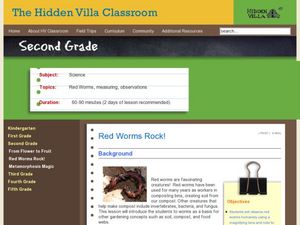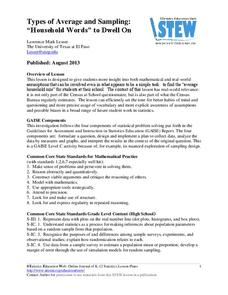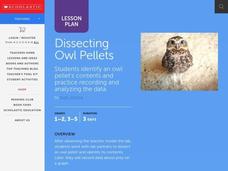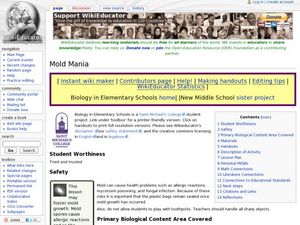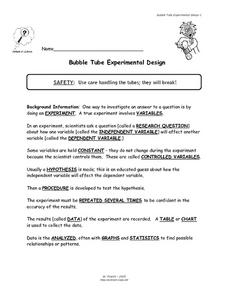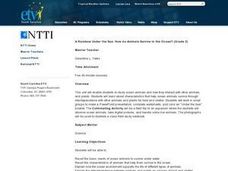Curated OER
Red Worms Rock!
Second graders measure red worms. In this lesson plan, 2nd graders observe and collect data on red worms. Students measure the red worms and create a graph with the data they collect.
Statistics Education Web
Types of Average Sampling: "Household Words" to Dwell On
Show your classes how different means can represent the same data. Individuals collect household size data and calculate the mean. Pupils learn how handling of the data influences the value of the mean.
Curated OER
Burger King Investigation
Students study data on the nutritional value of Burger King meals in order to discover its nutritional value and also to compare the meals, using mathematical computation, to the recommended daily diet. In this data handling lesson...
Curated OER
Color Mixing
Students experiment with primary colored water to mix new colors. They record new colors on a simple data sheet and share opinions on their work.
American Chemical Society
Evaporation
This is one in several lessons that explore the relationship between temperature and phase changes of water. After some discussion, elementary physical scientists place wet paper toweling on a hot and a room-temperature water bag...
University of Georgia
Heating and Cooling of Land Forms
Compare heating and cooling rates of different land forms. A lab activity has groups collect data on the rate of heating and cooling of soil, grass, saltwater, fresh water, and sand. An analysis of the rates shows how the different land...
Curated OER
Dissecting Owl Pellets
Young scholars watch the teacher model the dissection then in pairs, they dissect an owl pellet and identify its contents. They record the data about its prey on a graph.
Curated OER
Dependence of Light Intensity on Distance
Hopefully you have a sensor interface for your physics class to use with graphing calculators when collecting data with a light sensor. If so, read on. Use this resource for learners to predict and then test whether or not the intensity...
Curated OER
Creating an Enzyme-Substrate Model
High schoolers explore the reaction rates of an enzyme-mediated reaction through experimentation. In small groups, they use everyday objects to demonstrate the effects of environmental variables on enzyme function.
Students graph and...
Cornell University
Mechanical Properties of Gummy Worms
Learners won't have to squirm when asked the facts after completing an intriguing lab investigation! Hook young scholars on science by challenging them to verify Hooke's Law using a gummy worm. Measuring the length of the worm as they...
Curated OER
An Enzyme- Substrate Model
Students explore reaction rates of an enzyme-mediated reaction. They examine the effects of environmental variables on enzyme function. Students collect, graph, and analyze data relating to the reaction.
Curated OER
Primary Biological Content Area Covered
Young scholars use the scientific method to make predictions about mold growth. In this fungus lesson plan, students use worksheets to help them illustrate predictions and graph mold growth from white to wheat bread. Young scholars first...
Curated OER
CAN'T TOUCH THIS!
Young scholars discover the best practical shielding material when dealing with radioactive substances. They draw conclusions based on availability of materials, price, and best shielding properties.
Curated OER
Aksing Questions -- What is Fame?
Students distribute copies of a survey to the local community about famous women. They gather the data and present it in a clear way. They examine the community's view on different issues.
Curated OER
Weights and Measures
Students master the gathering, averaging and graphing of data. They practice conversion to metric measures. They gain fluency in the use of technology tools for math operations.
Curated OER
Fishing Line Tests
Students test the strength of fishing lines. In this stress test lesson, students will investigate the breaking point of various fishing lines and graph the results.
Curated OER
Biotechnology Laboratory Research
Students participate in an extended laboratory research to experience how scientific information is obtained, upon which we build scientific knowledge and understanding.
Curated OER
Analyzing the Relationship between Snowpack and River Flow
Students use the Internet to research current and past snowpack levels and river gauging station readings. They determine the relationship between snowpack and river flow. They predict future river flow.
Curated OER
Bubble Tube Experimental Design
Students study what an experiment is comprised of and how to be successful when doing an experiment. In this experimental lesson plan students design their own experimental investigation and answer questions.
Curated OER
An Egg-cellent Osmosis Experiment
Learners investigate the problem of osmosis by conducting an experiment. They use eggs with the shells dissolved to tell whether fluid can move across the membranes. The experiment provides high interest for all kinds of students to keep...
Curated OER
A Rainbow Under the Sea: How do Animals Survive in the Ocean?
Second graders read books, watch videos, complete worksheets and participate in class discussions about ocean animals. They, in groups, design PowerPoint presentations on selected marine animals.
